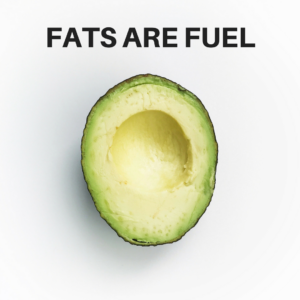“Fats make you FAT……” “EAT oily fish….” “DON’T eat fatty food…. ” “EAT avocado……”
Aaaarrrghh!! It’s all so confusing!
Let me tell you the truth about fat![]()
Let’s begin with what exactly is fat and why do we need it? Dietary fat, against popular belief, is very different to body fat. Body fat is excess energy (protein, carbs, fat) that has been converted to body fat as the body has not used it as fuel. Fat is actually a really useful fuel source that we use at low intensities (sitting, walking, jogging) to give us energy. Without enough dietary fat, our body relies on carbohydrates as fuel which has been shown to be a negative adaptation in the long term (meaning it will burn off your last meal rather than your spare tyre!).
What type of fat should you eat?
 Not all fats are equal. There are several different types of fat, and it can be difficult to know what types to eat and where to get them from. Many of those that make up a hefty proportion of our weekly diet land firmly in the ‘bad for your health’ camp. They come in tempting forms, like pastries and cakes, biscuits and crisps, chips, cheese, sauces, butter and any number of ready-prepared foods. They can be hard to resist, but they’re hard on the body, too, increasing the risk of coronary heart disease, cancer, stroke and weight gain.
Not all fats are equal. There are several different types of fat, and it can be difficult to know what types to eat and where to get them from. Many of those that make up a hefty proportion of our weekly diet land firmly in the ‘bad for your health’ camp. They come in tempting forms, like pastries and cakes, biscuits and crisps, chips, cheese, sauces, butter and any number of ready-prepared foods. They can be hard to resist, but they’re hard on the body, too, increasing the risk of coronary heart disease, cancer, stroke and weight gain.
However, not all fats are bad, there are fats that actually protect our bodies from serious conditions. Let’s break them down into three basic groups.
Trans fats are found in processed food sources including pastries, biscuits and deep-fried foods. These are extremely damaging to health and have been shown to increase the amount of a type of cholesterol called LDL-cholesterol in our blood. LDL-cholesterol is often called ‘bad’ cholesterol.
Why is high cholesterol harmful?
Too much LDL-cholesterol in our blood can cause fatty material to build up in the walls of our blood vessels and cause them to narrow. This increases the risk of blood clots, which can lead to a heart attack or stroke. ‘Good’ cholesterol (HDL-cholesterol) carries the LDL-cholesterol from the body to the liver to be broken down, so that too much doesn’t build up in our blood, we’ll talk more about these later.
Research has shown a strong link between trans fats and heart disease. It’s recommended to reduce intake of these foods in your diet.
Saturated fats have been given a bad rep in the press this is because like trans fats they too raise the levels of LDL in your blood. Whilst you do not want too much of these, a little is required in the diet for optimal functioning – find these in butter, milk, coconut oil, cheese and fat in meat.
 Is coconut oil good for me?
Is coconut oil good for me?
Coconut oil has recently become popular as a cooking ingredient, but it is very high in saturated fat – it actually contains more than butter! Whilst some saturated fat is good for us, you can consume too much of it and this can lead to heart disease.
Unsaturated fats help to maintain healthy cholesterol levels as they have higher levels of those ‘Good’ HDL – cholesterol and help deliver those bad ones (LDL) back to your liver to be broken down. Have fatty fish as often as possible, snack on nuts and nut butters, linseeds and flaxseeds and, include olive oil + avocado in your meals.
Fat keeps you full for longer compared to sugary carbohydrates
Fats keep you full for longer compared to carbohydrates. This makes them a good snack in between meals to make sure you’re not getting hungry.
Fat gives you unique vitamins that you can’t get elsewhere!
Fat sources allow you to digest fat soluble vitamins (A, D, E, K) which can only be processed in the presence of enough fat in your body. Low fat diets prevent you from having optimal vitamin levels so make sure you eat enough!
BEWARE – When eating fat, be conscious of total intake. Fat is denser in calories (9kcal per gram) compared to protein and carbohydrates (4kcal per gram). The amount of fat you need for optimal functioning/performance is individual and can be prescribed by our nutritionist. Consuming excessive quantities of fats will not have superior effects to the recommended dose, so watch out for all of those extra tablespoons of coconut oil in your coffee and too many avocados! These excess calories, unless an elite athlete expending over 5000kcal per day, will be stored as body fat when not required as energy!
To find out more about ratios of fat, protein and carbohydrates you should be eating specific to your body composition, goals and lifestyle, contact us on 0207 177 207 or newbodyosteo.wpengine.com
Author: Richie Barclay BSc, MSc, SENr Nutritionist at New Body Osteopathy.
